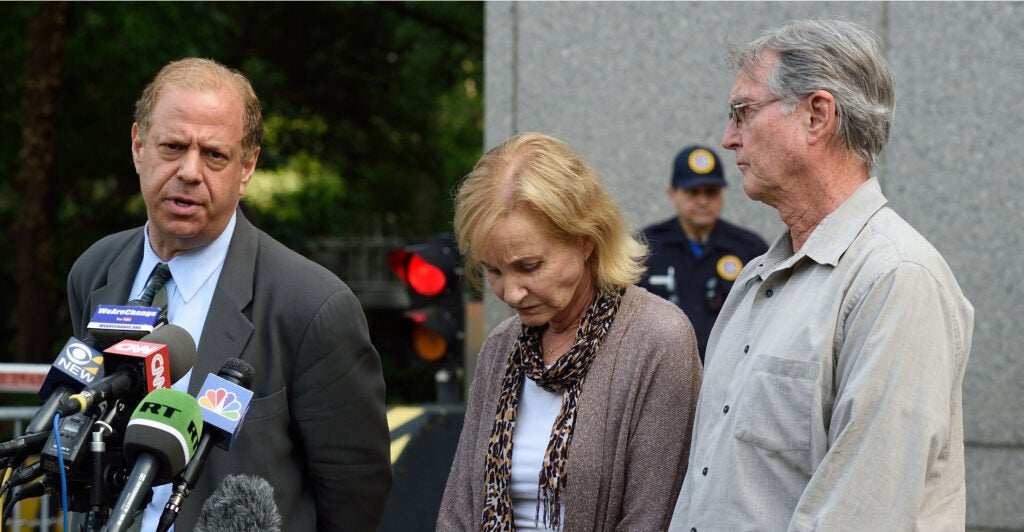Some are urging President Donald Trump to consider pardoning a pirate.
It’s been some time since anyone has uttered those words, but make no mistake, this pirate is just as dangerous and deserving of punishment as those who sailed the high seas centuries ago.
Ross Ulbricht used “Dread Pirate Roberts” as his sobriquet as he built an underworld dark web empire that would have made Blackbeard blush.
If it sounds sinister, it’s because it is.
The dark web generally refers to parts of the internet that someone needs specialized software—such as the Tor Browser—to access. It seeks to anonymize users, and as a result has become a hotbed for criminal activity, where users take advantage of bitcoins and other cryptocurrencies to anonymously make and receive payments for everything from guns and drugs to child pornography and human trafficking more generally.
That’s where Ulbricht, masquerading as Dread Pirate Roberts—an allusion to a character from the movie “Princess Bride”—saw an opportunity to profit and founded Silk Road. Think of it as an anonymous eBay or Amazon for drugs and other illicit activities.
Ulbricht made money by taking a percentage of each transaction that occurred on his site.
While reports make clear that Silk Road’s terms of service explicitly banned many types of transactions, it’s unclear how strictly Ulbricht enforced those restrictions.
More importantly, it’s clear, as The New York Times reported, “In just two and a half years … Silk Road had become a hub for more than $1.2 billion worth of transactions, many of them in cocaine, heroin, and LSD.”
As another writer, Nick Bilton, put it, “During [his] trial … prosecutors presented mountains of evidence showing that Ulbricht had approved the sale of almost every drug imaginable—even to minors. That he had allowed the sale of cyanide and guns. That he had created incentives and promotions to enable more people to sell more drugs on the Silk Road … .”
Ulbricht and his supporters have sought to portray Silk Road as a libertarian fantasy gone wrong.
He even had the audacity to argue at his sentencing that his website had been beneficial to the health of those who used it to buy or sell drugs, presumably because he removed the “risk” from the transactions by removing them from the streets and conducting them online.
But that’s not right. Just ask the parents of two individuals who died because of the drugs they purchased from Silk Road. One of the individuals was 25; the other, only 16.
In heartbreaking testimony at Ulbricht’s sentencing, those parents put human faces to the devastating consequences of Ulbricht’s actions.
And while some seek to influence the president’s decision by saying that Ulbricht is “a young man who has become a victim of our aggressive [Justice Department]” and someone who “got screwed by the feds with an insanely harsh sentence,” these individuals don’t know or aren’t highlighting key information the president needs to know.
It’s disingenuous to characterize Ulbricht, aka Dread Pirate Roberts, as some of those mentioned above have, as a “first-time offender, who committed a nonviolent crime.”
To be fair, Al Capone, who federal authorities indicted for tax evasion, could be characterized in much the same way. Is anyone buying that description for him? I didn’t think so. And they shouldn’t buy it for Ulbricht, either.
After all, plotting the murder-for-hire of five individuals sounds more like something Capone would do, rather than something a young man who “got screwed” by an “overly aggressive” Justice Department would do.
But that’s exactly what Ulbricht did.
Want to read the chats for yourself where he plots those murders? Here you go. They’re chilling.
And again, how many first-time, nonviolent offenders haggle over the price for killings, seek a bundle deal if multiple hits can be accomplished at once, agree to the torture of his victims if certain money or information can be recovered, and ask for photographic proof of at least one of the completed deeds?
Thank goodness that no one was actually killed in these plots. Ulbricht got scammed to the tune of more than $650,000, but he didn’t know that at the time.
And as Bilton, who watched the entirety of Ulbricht’s trial and ultimately wrote a book about it, says:
Now, as his family and supporters try to get him a commutation, the argument is that Ulbricht was never officially charged with murder, either because the assassinations didn’t actually happen, or because someone else logged into his account and ordered the hits … .
Having read every single line of those 2.1 million words of chat logs with this employees, there’s no question that Ulbricht was in charge of that site from the moment it was started to the moment he was caught in [a San Francisco public] library. He wasn’t framed. He wasn’t innocent. He was the one and only Dread Pirate Roberts.
And for his crimes, Ulbricht “was handed five sentences: one for 20 years, one for 15 years, one for five and two for life. All are to be served concurrently [at the same time] with no chance of parole.”
Those are harsh sentences, to be sure. And there may be a day—many, many years in the future—when a commutation is appropriate. But that day certainly isn’t today, less than six years since a judge imposed those sentences.
When the pirates of yesteryear hoisted the Jolly Roger and set sail in search of treasure and to plunder and pillage, they knew the risks. So did Ulbricht. He just didn’t think he would get caught.
